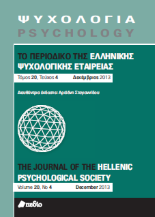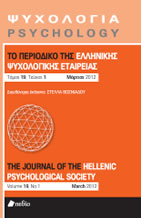The efficacy of social skills training for individuals with schizophrenia

Abstract
Ten individuals with schizophrenia and two with schizoaffective disorder received group training in social skills, including conversation skills, friendship skills, and dating skills as well as problem-solving skills. The training, coupled with case management, was administered twice per week for one hour each session for a total of 5 months. The primary
outcome measures were the Social Contact and Communication subscales of the Life Skills Profile, the WHOQOL-BREF, and the Self-efficacy/self-esteem subscale of the Empowerment Scale. Based on these, participants’ social functioning, community functioning, and self-efficacy perceptions were assessed respectively. Measures were taken at pre-treatment and post-treatment. Patients’ social functioning and
community functioning improved over time whereas self-efficacy beliefs did not significantly change. Patients who completed homework assignments frequently improved more in social contact compared to patients who completed homework assignments infrequently. Findings suggest that social skills training for outpatients with chronic mental illness leads to acquisition of social skills that are important in everyday life. Case management is a critical aspect of treatment that enhances learning and transfer of social skills outside the immediate training setting. Benefits from social skills homework assignments mainly depend on the type of homework.
Article Details
- How to Cite
-
Ντούσια Π., Κατσαμάγκος Α., & Οικονόμου Μ. (2020). The efficacy of social skills training for individuals with schizophrenia. Psychology: The Journal of the Hellenic Psychological Society, 20(1), 34–53. https://doi.org/10.12681/psy_hps.23518
- Issue
- Vol. 20 No. 1 (2013)
- Section
- RESEARCH PAPERS

This work is licensed under a Creative Commons Attribution-ShareAlike 4.0 International License.
The journal PSYCHOLOGY adopts a Platinum open-access policy. Submission, processing or publication costs are waived by the Hellenic Psychological Society. Papers published in the journal PSYCHOLOGY are licensed under a 'Creative Commons Attribution-ShareAlike 4.0 International' licence. The authors reserve the copyright of their work and grant the journal the right of its first publication. Third-party licensees are allowed to use the published paper immediately after publication as they wish, provided they retain the defined by the license copyright formalities, regarding the reference to its author(s) and its initial publication in the journal PSYCHOLOGY. Moreover, any adjusted work should be shared under the same reuse rights, so with the same CC license.




